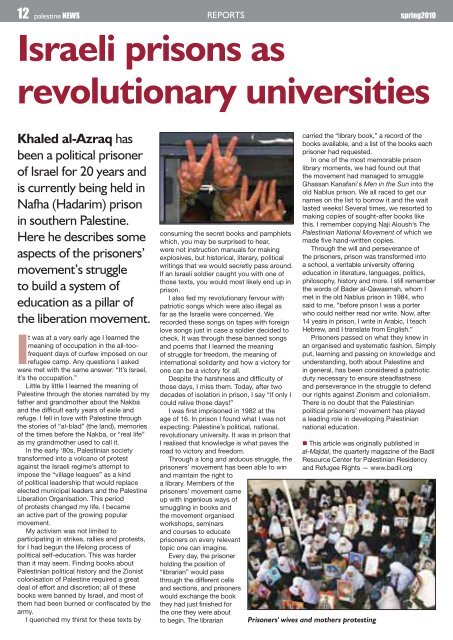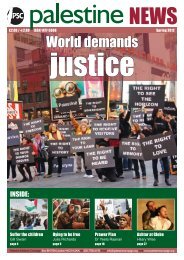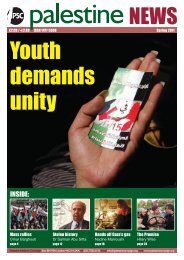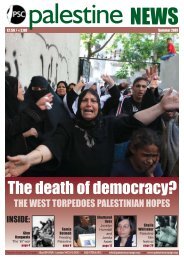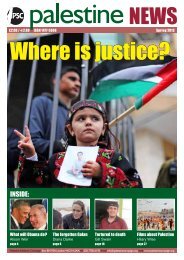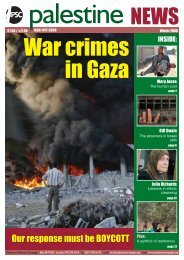INSIDE: - Palestine Solidarity Campaign
INSIDE: - Palestine Solidarity Campaign
INSIDE: - Palestine Solidarity Campaign
You also want an ePaper? Increase the reach of your titles
YUMPU automatically turns print PDFs into web optimized ePapers that Google loves.
12 palestine NEWS REPORTS<br />
spring2010<br />
Israeli prisons as<br />
revolutionary universities<br />
Khaled al-Azraq has<br />
been a political prisoner<br />
of Israel for 20 years and<br />
is currently being held in<br />
Nafha (Hadarim) prison<br />
in southern <strong>Palestine</strong>.<br />
Here he describes some<br />
aspects of the prisoners’<br />
movement’s struggle<br />
to build a system of<br />
education as a pillar of<br />
the liberation movement.<br />
It was at a very early age I learned the<br />
meaning of occupation in the all-toofrequent<br />
days of curfew imposed on our<br />
refugee camp. Any questions I asked<br />
were met with the same answer: “It’s Israel,<br />
it’s the occupation.”<br />
Little by little I learned the meaning of<br />
<strong>Palestine</strong> through the stories narrated by my<br />
father and grandmother about the Nakba<br />
and the difficult early years of exile and<br />
refuge. I fell in love with <strong>Palestine</strong> through<br />
the stories of “al-blad” (the land), memories<br />
of the times before the Nakba, or “real life”<br />
as my grandmother used to call it.<br />
In the early ‘80s, Palestinian society<br />
transformed into a volcano of protest<br />
against the Israeli regime’s attempt to<br />
impose the “village leagues” as a kind<br />
of political leadership that would replace<br />
elected municipal leaders and the <strong>Palestine</strong><br />
Liberation Organisation. This period<br />
of protests changed my life. I became<br />
an active part of the growing popular<br />
movement.<br />
My activism was not limited to<br />
participating in strikes, rallies and protests,<br />
for I had begun the lifelong process of<br />
political self-education. This was harder<br />
than it may seem. Finding books about<br />
Palestinian political history and the Zionist<br />
colonisation of <strong>Palestine</strong> required a great<br />
deal of effort and discretion; all of these<br />
books were banned by Israel, and most of<br />
them had been burned or confiscated by the<br />
army.<br />
I quenched my thirst for these texts by<br />
consuming the secret books and pamphlets<br />
which, you may be surprised to hear,<br />
were not instruction manuals for making<br />
explosives, but historical, literary, political<br />
writings that we would secretly pass around.<br />
If an Israeli soldier caught you with one of<br />
those texts, you would most likely end up in<br />
prison.<br />
I also fed my revolutionary fervour with<br />
patriotic songs which were also illegal as<br />
far as the Israelis were concerned. We<br />
recorded these songs on tapes with foreign<br />
love songs just in case a soldier decided to<br />
check. It was through these banned songs<br />
and poems that I learned the meaning<br />
of struggle for freedom, the meaning of<br />
international solidarity and how a victory for<br />
one can be a victory for all.<br />
Despite the harshness and difficulty of<br />
those days, I miss them. Today, after two<br />
decades of isolation in prison, I say “if only I<br />
could relive those days!”<br />
I was first imprisoned in 1982 at the<br />
age of 16. In prison I found what I was not<br />
expecting: <strong>Palestine</strong>’s political, national,<br />
revolutionary university. It was in prison that<br />
I realised that knowledge is what paves the<br />
road to victory and freedom.<br />
Through a long and arduous struggle, the<br />
prisoners’ movement has been able to win<br />
and maintain the right to<br />
a library. Members of the<br />
prisoners’ movement came<br />
up with ingenious ways of<br />
smuggling in books and<br />
the movement organised<br />
workshops, seminars<br />
and courses to educate<br />
prisoners on every relevant<br />
topic one can imagine.<br />
Every day, the prisoner<br />
holding the position of<br />
“librarian” would pass<br />
through the different cells<br />
and sections, and prisoners<br />
would exchange the book<br />
they had just finished for<br />
the one they were about<br />
to begin. The librarian<br />
carried the “library book,” a record of the<br />
books available, and a list of the books each<br />
prisoner had requested.<br />
In one of the most memorable prison<br />
library moments, we had found out that<br />
the movement had managed to smuggle<br />
Ghassan Kanafani's Men in the Sun into the<br />
old Nablus prison. We all raced to get our<br />
names on the list to borrow it and the wait<br />
lasted weeks! Several times, we resorted to<br />
making copies of sought-after books like<br />
this. I remember copying Naji Aloush’s The<br />
Palestinian National Movement of which we<br />
made five hand-written copies.<br />
Through the will and perseverance of<br />
the prisoners, prison was transformed into<br />
a school, a veritable university offering<br />
education in literature, languages, politics,<br />
philosophy, history and more. I still remember<br />
the words of Bader al-Qawasmah, whom I<br />
met in the old Nablus prison in 1984, who<br />
said to me, “before prison I was a porter<br />
who could neither read nor write. Now, after<br />
14 years in prison, I write in Arabic, I teach<br />
Hebrew, and I translate from English.”<br />
Prisoners passed on what they knew in<br />
an organised and systematic fashion. Simply<br />
put, learning and passing on knowledge and<br />
understanding, both about <strong>Palestine</strong> and<br />
in general, has been considered a patriotic<br />
duty necessary to ensure steadfastness<br />
and perseverance in the struggle to defend<br />
our rights against Zionism and colonialism.<br />
There is no doubt that the Palestinian<br />
political prisoners’ movement has played<br />
a leading role in developing Palestinian<br />
national education.<br />
• This article was originally published in<br />
al-Majdal, the quarterly magazine of the Badil<br />
Resource Center for Palestinian Residency<br />
and Refugee Rights — www.badil.org<br />
Prisoners' wives and mothers protesting


